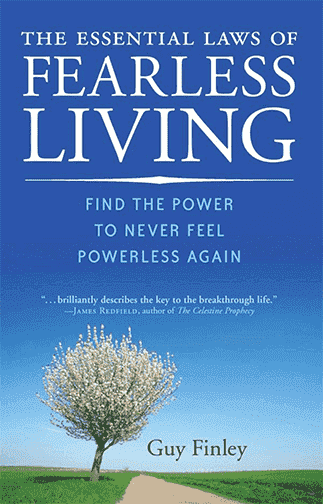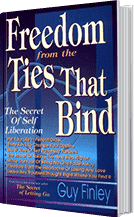Negative States
-
 Special Lesson
Special LessonIdentifying With a Negative Reaction is Not Inevitable
- Posted: 04/23/24
- 1204 words
- 0 View
- Comments (0)
We have in us -- built over time as part of the construct of our personality - a literal host of demands. Things that over time have been thought over and over and over again until the construction of those thoughts becomes an unconscious attitude. For instance, if you think enough times, "Why are they doing this? I shouldn't be treated like this!" Gradually, you walk around with a chip on your shoulder, but you don't know it's a chip on your shoulder...
-
Multi
Format
 Short Talk
Short TalkStop Drinking the Poison of Negative States
- Posted: 08/14/22
- Meeting: 07/27/22
- Time: 00:01:44
- 0 View
- Comments (0)
In this answer to a viewer's question, "Secret of Letting Go" author Guy Finley explains that it is not enough to simply say that you are no longer going to be deceived by negative states such as fear and anger. If you ever want to be free and in command of your own mind, then you must begin to taste the bitterness inherent in those poisonous negative states...
-
Multi
Format
 Short Talk
Short TalkStrike at the Root of Negativity
- Posted: 05/26/22
- Meeting: 05/04/22
- Time: 00:03:46
- 0 View
- Comments (0)
In this answer to a viewer's question, "Secret of Letting Go" author Guy Finley talks about the imperative to observe the nature of negativity itself instead of complying with whatever the negativity is telling you to do.
-
 Special Lesson
Special LessonThe Sure Way to Release Yourself from Negative States
- Posted: 04/28/22
- 717 words
- 0 View
- Comments (0)
There is no consumptive negative state in the consciousness without resistance being the "goo" it grows out of -- something black and dark pulling and pushing on you. And in the moment that dark state starts to swallow you, when you're starting to feel sorry for yourself, or you're trying to figure out what to do about something because you're asleep to yourself, all you know to do is to push back...
-
Multi
Format
 Short Talk
Short TalkFind the Source of Freedom
- Posted: 04/08/22
- Meeting: 03/23/22
- Time: 00:03:38
- 0 View
- Comments (0)
In this answer to a viewer's question, "Secret of Letting Go" author Guy Finley talks about owning your own attention for the purpose of observing the painful tendency to blame everything outside of yourself as the cause of whatever is disturbing you.
-
Multi
Format
 Short Talk
Short TalkAre You "Dread" or Alive?
- Posted: 08/28/21
- Meeting: 08/11/21
- Time: 00:13:30
- 0 View
- Comments (0)
In this excerpt from a recent classroom talk, Guy talks about how agreeing to live with fear, worry, anxiety, depression -- or any other negative state -- is the same as living in the "dread zone," a psychological state of useless suffering that prevents us from being alive and aware in the present moment.
-
Multi
Format
 Short Talk
Short TalkBe Yourself and Free Yourself by Seeing Yourself
- Posted: 06/24/21
- Meeting: 06/16/21
- Time: 00:04:38
- 18 Views
- Comments (1)
In this question and answer session, Guy explains that not wanting to see something about ourselves actually attaches us to the very thing that we say we don't want. So the task is not to change what we see. Instead, the task is to observe ourselves so that we can be changed by the very awareness that is observing.
-
 Special Lesson
Special LessonMake the Requests that Lift You Above Yourself
- Posted: 04/08/21
- 649 words
- 43 Views
- Comments (0)
When you don't -- when you consciously won't -- express some negative state, you are literally asking for awareness of a higher self. Here's why... As you don't express that state, you become conscious of yourself as the ground upon which it is breaking as well as the presence of that visiting state. In this moment of new awareness there is something there inside of you, with you...
-
 Special Lesson
Special LessonChoose the Path that Leads to Revelation
- Posted: 10/15/20
- 554 words
- 41 Views
- Comments (0)
If there could be only one idea -- a lamp whose light could show the aspirant of real life the way out of the prison of dark thoughts and punishing feelings -- it would surely be this: your true self doesn't win in life by overpowering problems but by revealing they never really existed as you once believed they did. Truths such as this can be difficult to accept. Tell some people...
-
 Special Lesson
Special LessonStop Being Undone by the Life that Makes You New
- Posted: 06/29/20
- 405 words
- 9 Views
- Comments (0)
We must learn to recognize, realize, and release those moments in which we find ourselves struggling with what has "unmade" us. Here's how one recognizes the moment in which this unmaking has taken place: if you're getting negative, life has come, and it's unmade (you). It's taken away that precious image we have of ourselves where we've imitated someone or something...
-
 Special Lesson
Special LessonTest the Reality of Self-Punishing States
- Posted: 10/05/19
- 299 words
- 4 Views
- Comments (0)
Regardless of the assertion of any negative state that seeks to convince you otherwise (using its painful presence within you as "proof" that the prison you're locked within will stand until the end of time), apply this one great truth: All self-punishing states are "lies." They must break down if they don't succeed in breaking down your willingness to test their reality. How do you...
-
 Special Lesson
Special LessonDeliberately Drop Your Own Negativity
- Posted: 10/25/18
- 552 words
- 2 Views
- Comments (0)
The instant we become aware of any negative thought or feeling wanting us to embrace its agitation - not only must we drop it on the spot, but we must also drop any familiar sense of self that has appeared with it in that same moment.
















